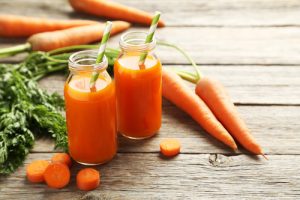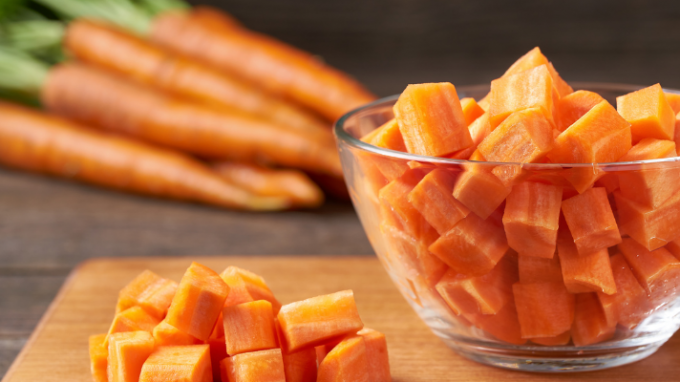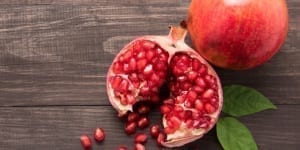Infertility is becoming more common in the United States. According to UCLA health statistics (2020), approximately 15 percent of U.S. couples will experience fertility problems at some point in their lives. Although many factors play a role in both male and female infertility, increasing health research points to the North American diet as a major cause of the problem.
When it comes to boosting men and women’s fertility nutrition, there are a number of possible modifications and additions that can be included and carrots are one powerhouse vegetable that should not be overlooked. Rich in beta-carotene, vitamin A, and antioxidants, the nutritional makeup of carrots offer many fertility benefits to both men and women.
Key Nutrients That Affect Female Fertility
There is no doubt, when trying to conceive, women’s nutrition can play a vital role in fertility health and creating a healthy foundation for conception to occur. Among the many essential nutrients that impact women’s fertility, some key ones include vitamin A, vitamin K, and folate.
- Vitamin A: Vitamin A is essential for a healthy reproductive system in women, and a lack of this nutrient can lead to problems with ovulation and infertility.
- Vitamin K: Vitamin K is important for blood clotting, but it has also been shown to help prevent miscarriage in pregnant women with low levels of this nutrient, which can lead to abnormal menstrual bleeding.
- Folate: This water-soluble B vitamin plays an important role in DNA synthesis and cell division, critical for healthy egg production. A lack of folate can lead to increased homocysteine levels, which affects the quality and functioning of eggs.
Nutrients That Affect Sperm Quality

- Vitamin A: Vitamin A is crucial in the production of sperms. Studies have shown that individuals deficient in vitamin A suffer from a lower sperm count than individuals who have a normal nutrient level.
- Vitamin K: Vitamin K is necessary for the activation of proteins that are involved in blood clotting. One of these proteins, called “coagulation factor II” or prothrombin, is also essential for sperm to fertilize an egg.
- Folate: This water-soluble B vitamin plays an important role in DNA synthesis and cell division, critical for healthy sperm production. A lack of folate can lead to increased levels of homocysteine. This amino acid affects the functioning of sperms, and high levels of the chemical can cause neural tube defects in the fetus.
How Carrots Are a Fertility Superfood
Contrary to common belief, carrots are not high in vitamin A, rather, it is high in the carotenoid, beta-carotene, which is then converted into vitamin A in the body. This vitamin A contributing source of beta-carotene is a key chemical that can improve both men and women’s fertility and improve the results of assisted reproductive technology and fertility treatments. In fact, in one study, beta-carotene was found to improve sperm motility by 6.5 percent to 8 percent.
Along with the nutrients mentioned above, there are other essential building blocks of the nutrients found in carrots that build it up into the fertility superfood that it is. Rich in additional nutrients such as vitamin C, B6, biotin, fiber, potassium, thiamine, and rich in antioxidants, carrots are known to protect heart and eye health, and studies have even evaluated the effectiveness of carrots at reducing the rates of bladder, cervical, prostate, colon, larynx, and esophageal cancers.
Carrot Juice Recipes for Fertility Health

That being said, for those looking to include a carrot juice pick me up in their routine, here are two simple and delicious juice recipes to enjoy guilt-free. Just remember to not peel the carrots before juicing, as the skin contains a lot of beta-carotene.
Ingredients:
- 2 C carrots, washed
- 1 C cantaloupe, cubed
Directions:
- Pass the cantaloupe through a slow pulp juicer followed by the carrots. Mix together well and enjoy at room temperature or cold.
- To add additional flavor to this drink you can try adding 1 C of chopped orange, or ½ chopped cucumber.
Ingredients:
- 1 1-inch spear fresh ginger, peeled
- 2 C carrots
- 1 tsp honey
Directions:
- Peel off the skin of one-inch of fresh ginger (the skin can cause stomach cramps for some people).
- Feed two cups of carrots and the ginger through a slow pulp juicer.
- Mix together with the honey to sweeten the juice and enjoy.
Incorporating Carrot Pulp into Recipes
One noticeable trait of juicing fruit and vegetables is the abundance of leftover nutrient-dense pulp. In fact, approximately six grams of fiber end up in the pulp left over after juicing only four large carrots. This fiber can be essential to regulating digestion, maintaining healthy cholesterol levels and regulating blood sugar.
Rather than toss the remaining dried pulp after making carrot juice, put the pulp to use with these tasty options.
Ingredients:
- 6 C vegetable broth
- 4 Tbsp unsalted butter
- 2 C cantaloupe-carrot pulp
- 3 shallots, chopped
- 2 garlic cloves, chopped
- 2 C Arborio rice
- 1 C white wine
- ¼ C mascarpone cheese
- 2 oz prosciutto, chopped
- Fresh basil, to taste
Directions:
- Bring vegetable broth to a simmer and set aside.
- Melt butter in a large saucepan over medium-high heat.
- Add the cantaloupe-carrot pulp, shallots, and garlic cloves to the saucepan. Cook the mixture, stirring often, for ten minutes.
- Stir in the arborio rice and white wine. Cook for two minutes.
- Add the broth ½ cup at a time stirring the mixture after each addition until liquid is absorbed. Add broth and simmer until the rice become tender. This process takes approximately 30 minutes.
- Add mascarpone cheese and chopped prosciutto to the rice, mixing well until all the ingredients are distributed evenly.
- Top with thinly sliced basil. Plate and enjoy.
Ingredients:
- 1 1/2 C white whole wheat flour
- 1 tsp baking soda
- 1 tsp ground cinnamon (more or less as desired)
- 1/4 tsp ground nutmeg
- 1/2 tsp salt
- 2 tbsp butter, melted
- 1/2 C honey
- 1 egg, lightly beaten
- 1 tsp pure vanilla extract
- 1 C unsweetened applesauce
- 1 C carrot-ginger pulp
Directions:
- Preheat the oven to 350 degrees F and grease a 12-cup muffin tin.
- Mix all dry ingredients in a large bowl.
- Combine all wet ingredients (except the pulp) into the dry mixture.
- Fold in the carrot pulp until the batter is well combined without overworking the batter.
- Distribute the batter into the muffin tin wells evenly and bake for 17 to 20 minutes, or until a toothpick comes out clean.
- Transfer the muffin tin to a wire rack. Allow the muffins to sit for 10 minutes before taking them out of the tin to enjoy.
*Ingredient Note: For those wondering if a whole-wheat flour will work. The flavor may vary. Whole-wheat flour is made from hard red spring or winter wheat, giving it a nutty, hearty taste. White whole-wheat flour on the other hand is made from hard white spring or winter wheat, which has the exact same nutritional value as whole-wheat flour, but gives it a milder flavor and paler color.




